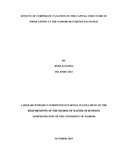| dc.description.abstract | The strength of securities markets that make them focal points of modern finance is their ability to mobilize long term savings for financing long term ventures, to improve efficiency of resource allocation through competitive pricing mechanisms, to provide risk capital (equity to entrepreneurs), and to encourage broader ownership of firms. The Kenyan tax system, just like that of many other countries, is largely based on formal labels, and only indirectly on underlying asset characteristics. In turn, equity faces one set of tax rules while debt faces another often more favourable. The disparity in tax treatment raises the need for analysis for the relationship between the tax rate and the level of leverage. Especially, in the presence of different tax treatments for the various sources of finance and in view of the fact that financial policies affect the user cost of capital and investment. With regard to the source of finance, the Kenyan tax strongly favors debt rather than equity capital mainly because it provides complete deductibility of interest expenses and no relief for the opportunity cost of equity capital . This study seeks to examine the effects of corporate taxation on the capital structure of firms listed in Nairobi Stock Exchange (NSE). This study adopted an explanatory research design. The population of the study consisted of all the 62 companies listed in the Nairobi Stock Exchange (NSE). The target population was composed of 19 non-financial firms listed in the NSE as at 31st December 2014. Data was analysed using descriptive statistics, correlation analysis and regression analysis. The study revealed that there was positive significant relationship between effective tax rate and capital structure of firms listed in the Nairobi Securities Exchange. The study also found that a unit increase in effective tax rate lead to increase in capital structure of firms listed in the NSE. The study also found that a unit increase in size of the firm lead to increase capital structure of firms listed in the Nairobi Securities Exchange. The study further established that there was strong positive relationship between size of the firm and capital structure of firms listed in the Nairobi Securities Exchange. The study further established that there was strong positive relationship between risk and capital structure of firms listed in the Nairobi Securities Exchange, from the findings on the regression analysis the study found that a unit increase in risk lead to increase in capital structure of firms listed in the Nairobi Securities Exchange. There is need for the management of firms listed in the NSE to use more of debt when financing their projects. Thus the study recommends that there is need for the management of firms listed in the NSE to enhance their size as it affects the capital structure positively. | en_US |

